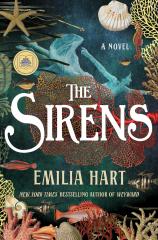Reading Group Guide
Discussion Questions
The Sirens

1. Mary, Eliza, Jess and Lucy are separated by more than 200 years, yet they are closely aligned throughout the novel. What experiences do they share, and what does this suggest about feminine struggles across generations? How do their experiences also differ?
2. “[The sea] was gray and furious, lapping at the rocks as if it would eat the land.” (page 22) Discuss the ocean as a character and how, by the end, Mary considered it “a female world.” (page 314) Consider the kinds of events that took place on land or ship, as opposed to underwater. Similarly, how do the power dynamics between men and women shift between land and sea? Why do you think Mary referred to the ocean as feminine?
3. Lucy’s and Jess’ sleepwalking makes them feel like they lack control of their bodies at times. How does this relate to the various sexual assault scenarios mentioned in the story?
4. Bridie is ridiculed by other women on the ship for going with sailor Wright, but she often shares her earnings with them. Why do you think she does this?
5. How do the convicted women evolve over the course of their journey? What changes do you see in their characters?
6. Lucy and Jess often feel like outcasts and, at points, long to be seen as beautiful. How do their efforts to hide their skin limit them? Discuss the turning point(s) for when they no longer sought external validation.
7. Once Mary and Lucy decide to embrace what makes them unique and give in to the ocean’s call, their “otherness” quite literally saves lives. What do you think this element of the plot suggests about the power of self-love and acceptance, and its ripple effects?
8. Jess and Lucy are committed to uncovering their respective origin stories. How do their eventual discoveries affect their sense of selves, if at all? Consider one of the final scenes where Jess, Lucy, Robert and Judy are all together in the kitchen. How does transparency change the dynamic of their relationships?
9. As Mary’s, Eliza’s, Lucy’s and Jess’ minds are invaded by thoughts, voices and dreams, they often resort to physical sensations as a way to return to the present. How often do you find yourself living in your mind more than in your body?
10. Why do you think Mary and Eliza came to Lucy and Jess via their dreams? Additionally, elaborate on why you think Mary’s and Eliza’s voices quieted around the time Lucy and Jess were united as mother and daughter.
11. The word “capture” is mentioned several times throughout the narrative, often referring to Jess’ or Robert’s struggles to depict an ethereal essence in their art. In what ways do you think the novel nods to the beauty of freedom and constant change?
12. “Just because other people are frightened of the truth doesn’t mean that Lucy has to be.” (page 127) How does Lucy’s innate passion for the truth drive her narrative forward?
13. What role does the media (podcasts, newspapers, magazines, etc.) play in immortalizing some (but not all) victims’ stories, and how important is careful reporting? How does a place (especially a small town) develop a mythology?
14. Consider Lucy’s interest in true crime podcasts. What about them compels her? Do you find yourself similarly drawn to this type of storytelling? What do you think this novel ultimately has to say about the capacity for any kind of investigative reporting to identify the truth? How might the facts of a case differ from the truth of it?
15. Lucy did not feel protected by the student welfare office or the police. Have you or has anyone you know experienced a similar kind of injustice? What are the harmful effects of this, for women and society as a whole?
16. As a result of directly experiencing the failed justice system as a woman, Lucy became aware of her power. “Freed from her prior inhibitions --- from the compulsion to be nice, to be a good girl --- she’d become something she could never have imagined. She’d become...dangerous.” (page 126) What female traits and behaviors could lead her to be deemed dangerous? What kind of person would see those traits as dangerous and put a label on a woman? How are Jess, Mary and Eliza also perceived as dangerous by the men in their lives?
17. Consider the novel’s depictions of sisterhood and mother-daughter relationships. How do women care for each other in the world of The Sirens? What are the lengths to which they go to protect each other?
18. Where do you imagine the characters are now?
The Sirens
- Publication Date: April 1, 2025
- Genres: Fiction, Historical Fiction, Magical Realism, Women's Fiction
- Hardcover: 352 pages
- Publisher: St. Martin's Press
- ISBN-10: 1250280826
- ISBN-13: 9781250280824







